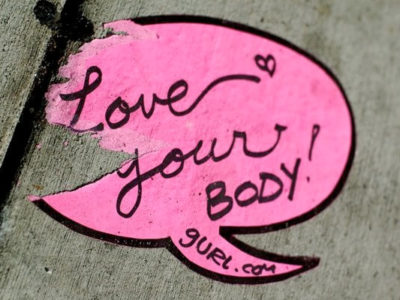Let’s be real for a second. We college women face some pretty grim challenges, like the reality of a future wage gap or sexual abuse on campus. But one reality that often goes unnoticed is our constant desire to have the abs of an athlete with the butt of Jennifer Lopez. Women want to be intellectuals, but also beauty queens. I mean, who doesn’t want to be as captivating as Jennifer Lawrence or Kerry Washington, aka Olivia Pope? Somewhere on our endless journey to be flawless, we all face one common struggle: body image.
What even is it?
You know that feeling you get when you see yourself in the mirror? Not the you reflecting back with the perfectly winged eyeliner. I’m talking about the unpainted, unaltered canvas you wake up to every morning.
For some of us, the image we have of ourselves shows a skewed perception. We criticize and nag at our non-contoured looks until we no longer feel comfortable in our bodies. This negative sense of self infects our minds and induces shame towards how we look. So how did we get to a place where we aren’t content with just looking like a human being?
What causes these warped views?
Think of the last Victoria’s Secret commercial you saw in between episodes of Keeping Up With the Kardashians. Those thin, big breasted women aren’t just making you want to go get that 5 for $27 deal. Many of us strive to be just like the perfect Angels in the commercials, but fail to realize that tiny legs and narrow hips aren’t the reality for many women. Maybe us college women should watch a little less America’s Next Top Model and a little more MasterChef; invest our interest into making delicious food instead of avoiding it.
We look to our friends for advice, dinner dates, hang out buddies and study partners. It’s no surprise that we turn to our friends when we feel insecure about our arm flab as well. Research by Dr. Louise Wasylkiw and Molly Williamson from Mount Alison University shows that a woman’s perception of her body is influenced by how that woman believes her friends feel about her body.
Dr. Louise Wasylkiw explains that, “What we found was that women perceived their friends to be similar to them in terms of how they felt about their bodies (i.e., If I am unhappy with my body, I think my friends are unhappy with their bodies) and this makes sense in that it validates my own feelings.”
Our family members also get in our heads when it comes to how we see our bodies. Young girls learn about themselves through the lens of good ol’ mom and pop. Do they remind us how awesome we are? Or, do they constantly nag us about our clothes and makeup before going out? Beauty is in the eye of the beholder, but if the beholder is someone like my friends mother who tells her to daughter to put makeup on before leaving the house, then she will always feel the need to layer on the MAC.
Are we looking up to celebrities or looking down on ourselves?
Take a second, have a Snicker’s, and think about the celebrities you follow on Instagram. If I can admit how jealous I get of Rihanna’s gorgeous body, you can, too. We just have to jolt ourselves back into reality. Celebrities have stylists to keep them looking flawless at all times. I don’t have time for that, I just spent my free second with a Snicker’s.
University of Georgia professor Dr. Analisa Arroyo has researched body image issues and how celebrities play an important role in the way we view our physique. “Some women don’t recognize that a lot of the images they see of celebrities are touched up, or that they have professional stylists and make-up artists that help them look the way they look,” Arroyo said. “Even their everyday looks that we see taken by paparazzi or on their social media accounts usually involve a few hours of professionals helping them get ready. This is not natural, and if we compare to this ideal, we will be unsatisfied with the way we look.”
Where do we see pictures of these celebs? On every college gal’s love: social media. Our constant need to compare our pictures to women hiding behind filters, pounds of makeup and photo-shopped images does serious damage. Social media has created a generation that obsesses over perfect butts because everyone on Instagram has them. Pro tip: their butts aren’t as perfect after a change of angle and lighting.
“People have found that women who use social media more have lower levels of body satisfaction, likely through social comparison,” Arroyo said. “What we post on social media is usually images of our ‘best’ selves. If we are comparing ourselves to the perfect version that others post online, this might create unrealistic expectations.”
How do we kick this bad habit?
Dr. Linda Bacon, Professor at City College of San Francisco, associate nutritionist at the University of California at Davis and author of many books concerning nutrition, recognizes that the process to accepting one’s body is difficult but attainable. “Recognize what really is important in the world and surround yourself by people who share the same values as you,” Bacon said.
Dr. Arroyo thinks that we could all benefit from stopping the silent competition. “As we get older, it would be important to start looking for other positive qualities that we have, not just appearance. I also think it would beneficial that we continue to uplift other women, not just in terms of appearance, but also other qualities as well.”



















